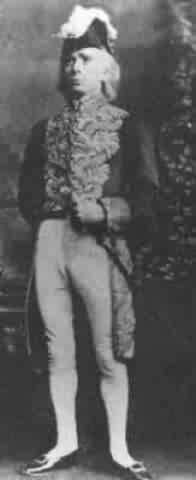|
|
|
 |
George Grossmith, one of the most famous of all Savoyards, was born on 9th December, 1847. His father, also called George Grossmith, was a journalist, and was among those present at the opening of the first Gaiety Theatre in 1868. Our George worked originally with his father as a reporter on "The Times", at Bow Street Police Court.
His first venture into "show business" was decorous - as an entertainer at the piano for private patrons, in the days when "nice" people did not go to the theatre.
In the 1870s he appeared as a juror in a benefit performance of "Trial by Jury" at the Haymarket Theatre, where he met Arthur Sullivan. Soon afterwards, in Bayswater, he played the major role of the Judge and was noticed by W. S. Gilbert.
These occasions led to a development. Sullivan wrote offering him the part of John Wellington Wells in "The Sorcerer". Mrs. Howard Paul, who was to play Lady Sangazure, ran a small company herself, in which Grossmith had appeared. Hearing of Sullivan's offer to him, she urged him to accept. Despite misgivings, he attended Sullivan's audition, was found acceptable, and was despatched to see Gilbert. He told the librettist he expected they would choose an experienced artist.
"That's just what we don't want," Gilbert replied.
All the directors of the Comedy Opera Company, who then ran the operas, objected to Grossmith, except Gilbert, Sullivan, and Carte. But the latter trio had their way, Grossmith got the part, and was an instantaneous success. From this point until he left the operas he was regarded as the outstanding performer. Yet prior to "The Sorcerer" he had had no real stage experience.
At a rehearsal of "The Sorcerer" Sullivan asked the cast to parody Italian opera. It was badly done. Sullivan told them to try again. In his efforts to respond, Grossmith went to extremes, and almost tripped over the footlights.
"Splendid!" said the composer. "Next time you may go further. Never mind about your safety."
Grossmith, although he became the most brilliant of a galaxy of stars, did not escape Gilbert's acid tongue. Once, at a rehearsal of "Iolanthe" he complained that they had been over one passage some twenty times.
"What's that?" snapped Gilbert.
'I've rehearsed this business, Mr. Gilbert, until I feel a perfect fool."
"Now we can talk on equal terms," was W. S. G'.s rejoinder.
Grossmith was very fond of "Princess Ida", and there is certainly much to be said for his opinion that this opera had the finest music of all. He claimed that the King Gama solo "I can't think why" was one of the best Sullivan ever wrote. This excellent piece of satire certainly provided the actor with further scope to display his skill in characterisation.
In view of Grossmith's eminence in his profession, it is somewhat surprising to reflect that one of Sullivan's comments on the first night of "The Mikado" is that the piece was nearly wrecked by the comedian's "butterflies." However, he soon made up for this.
"The Mikado" had, of course, a very long original run. This engendered, eventually, a somewhat irresponsible attitude on the part of certain members of the cast. Gilbert had made it his business to check up - and George Grossmith was not exempt from censure over his antics with Jessie Bond, who was playing Pitti-Sing. Gilbert had heard that in their scene with the Mikado, when kneeling before him, Jessie Bond had given Grossmith a push, and he had rolled right over. Gilbert taxed the actor with this.
"But I got a big laugh", protested Grossmith.
"So you would if you sat on a pork pie", retorted the author.
Within a week of the opening of "Ruddigore" Grossmith became seriously ill. Henry Lytton successfully deputised until he recovered.
After "Ruddigore", Grossmith appeared in his last Savoy role - as Jack Point in "The Yeomen of the Guard". It is a further point of interest that whereas Grossmith, the established clown, deliberately played the ending of this opera with Jack Point swooning, as per libretto, Henry Lytton and George Thorne, in the provinces, played it as a tragedy.
After "The Yeomen of the Guard" Grossmith, who had put up with much at Gilbert's hands, quit the stage and returned to his former piano entertaining, and with his now-established reputation was highly successful. He also achieved great success as part-author, with his brother Weedon, of "The Diary of a Nobody".
He died on 1st March l912 - some nine months after Gilbert.
His son, George Grossmith, Jr. made his stage debut at the Criterion in 1892 in "Haste to the Wedding", an adaptation of "The Wedding March", which Gilbert had produced in 1873. The Criterion piece was specially written by Gilbert for Grossmith junior's debut, and music for it was written by George Grossmith of the Savoy.
Grossmith junior went on to become very famous in his own right - appearing in many George Edwardes productions, from "The Shop Girl" to "Our Miss Gibbs".
| Artist Index | Main Index |